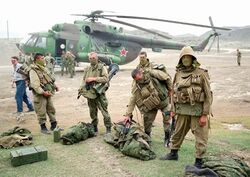Second Wheat War
This article is incomplete because it is pending further input from participants, or it is a work-in-progress by one author. Please comment on this article's talk page to share your input, comments and questions. Note: To contribute to this article, you may need to seek help from the author(s) of this page. |
| Second Wheat War | |||||||
|---|---|---|---|---|---|---|---|
| Part of The Vasilin Sea crisis | |||||||
 Saterocian troops land just outside of Elmonton, hours before the ceasefire agreement | |||||||
| |||||||
| Belligerents | |||||||
|
|
| ||||||
| Strength | |||||||
| 100,000 soldiers | 48,000 soldiers | ||||||
| Casualties and losses | |||||||
| ~200 soldiers killed |
351 soldiers killed | ||||||
The Second Wheat War, also known as the 1997 Saterocian invasion of Saroq, was an armed conflict in September of 1997 that happened primarily between Sateroc and Saroq. On 8 September 1997, on the 30th anniversary of the First Wheat War, Sateroc began a suden bombardment of Saroq, before launching a surprise invasion of the nation of Saroq, which had declared independence from Sateroc just four decades prior during the 1923 Sateroc crisis. The war lasted just 5 days, and compared to the previous war, Sateroc surpassed expectations due to their performance in the first war, reaching the outskirts of Elmonton before the ceasefire agreement came into effect. Although the war was inconclusive, it is largely referred to as a Saterocian victory due to their rapid advancements and later regional effects.
Background
Hostilities
Pre-war incidents
On 3 September, early in the day, it was reported that at least four Saterocian soldierd were killed after a military vehicle detonated a land mine placed near the Satero-Saroqi border. Although the Saterocian government blamed Saroq, it is alleged that the incident was a false-flaf operation in order to invoke tendions. In response, Puoc announced that the illegitamite Saroqi administration would be held accountable, with orders to impose severe consequences on the Elmonton government. Just moments later, intense clashes began as Saterocian forces struck several Saroqi positions right across the border, which killed an estimated 8 Saroqi troops.
In retaliation to the attacks, Saterocian opposition militants housed in Saroq ambushed Saterocian forces near the border, even capturing one troop before fleeing back into Saroq with no casualties. Due to this, the Modrome department bordering Saroq declared a state of emergency, requesting central military support amidst intense clashes. Saterocian forces in the area would later make an incursion into Saroq, capturing the militants that had taken a Saterocian soldier hostage and executed them. The Saroqi government called this a "clear" violation of Saroqi territorial integrity, and Saroqi troops would later fire spordically into Sateroc, injuring two civilians. Heading into September 4th, intense clashes continued with the deaths of several troops from both sides.
Amidst the heavy clashes, Andre Puoc convened an emergency meeting with high-ranking commanders in order to authorize a "legitimate military operation against insurgent forces". Saterocian authorities began a forced evacuation of Saterocian civilians living near the border, and those who resisted and refused to leave were harassed by Saterocian soldiers. In response to the evacuation, Saroqi authorities also announced an evacuation of civilians near the border in response to provocations by the government in Kolkesburg. According to North Euronian researchers, more than 30,000 civilians on both sides were evacuated in just a single day, with at least 100,000 more being evacuated throughout the next three days. On 6 September, a force of nearly 1,000 Brotherhood of Kolkesburg soldiers had arrived as volunteers in order to assist the Saterocian government in any potential military operations against Saroq. On the 6th, the Chief Administrator of the Saterocian Government in Saroq, Luerre Volvaine, which at that time was based in Kolkesburg, declared that Saroq was in the midst of an internal conflict between illegal rebels and the rightful government. Over the next two days, Saroqi newspapers had been reporting that Saterocian forces continued to be deployed near the Saroqi border, with Saterocian newspapers claiming that Saterocian forces were ready to fight in order to "liberate their brothers held hostage by a rebel government". On the evening of September 7th, the Saroqi government attempted to contact the Saterocian government through several third-party communication lines, however no responses were given as Saroq declard a national state of emergency in response to potential conflict with Sateroc.